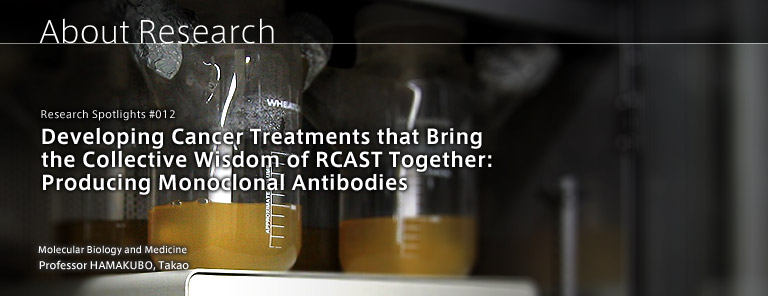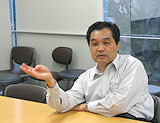- HOME
- Research
- Research Archives
- Developing Cancer Treatments that Bring the Collective Wisdom of RCAST Together: Producing Monoclonal Antibodies
Developing Cancer Treatments that Bring the Collective Wisdom of RCAST Together: Producing Monoclonal Antibodies

At present, Professor Hamakubo is conducting research on the production of monoclonal antibodies that bind to proteins on the surface of cancer cells. He aims to create methods of diagnosing and treating cancer, including the development of drugs that destroy cancer cells.
With a Cure for Cancer in Mind, Expectations on the Rise for Monoclonal Antibodies
Monoclonal antibodies are produced as antibody molecules secreted by homogenous cells cloned from the antibody-producing cells of mice with immunity to an antigen. Presently, it is possible to extract antibody genes from cloned cells and use the technology of molecular engineering to modify them into molecules that are best suited for treatment, such as clustered or hominized molecules.
Until recently, substances that bind to the surface proteins of cancer cells and block their growth were being considered as the aim of treatment, but now it is understood that macrophages and natural killer cells recognize and attack monoclonal antibodies that bind to the surface of cancer cells. In recent years, drugs such as Herceptin and Rituxan that use monoclonal antibodies have shown dramatic results in the treatment of breast cancer and malignant lymphoma, leading to rising expectations for the development of new pharmaceuticals.
Moreover, advances have been made in joint research on antibody drug discovery conducted with Chugai Pharmaceuticals over the last six years, and it is expected that clinical trials will be conducted next year. Other pharmaceutical companies have started active research and development in this field as well.
Pathbreaking Interdisciplinary Cancer Research Begun at RCAST

In 1975, Georges Kohler and Cesar Milstein invented the method for producing monoclonal antibodies, for which they won the 1984 Nobel Prize in Physiology or Medicine. However, when we began our research about six years ago, monoclonal antibody medicine had received mixed appraisals because of such factors as the limited effectiveness of mouse antibodies and high manufacturing costs.
Nevertheless, the reason that we were able to grapple with research in this field is that, thanks to the willingness to take on new challenges at RCAST, there was an environment where we could conduct joint research with professors in the engineering department. I am a medical researcher, but I have been able to conduct joint research with several different researchers, starting with Professor Tatsuhiko Kodama (Systems Biology and Medicine), director of the Laboratory for Systems Biology and Medicine and the Forerunner Pharma Research Co. at the Komaba Open Laboratory; Professor Hiroyuki Aburatani (Genome Science), who uses DNA chips to perform cluster analysis of human genes, of which there are said to be 30,000; and Professor Kenjiro Miyano(Photonics Materials), who works with super-sensitive diagnostic chips. Putting the collective wisdom of RCAST to use, our research has been producing excellent results. As this project expands, it is expected that we will succeed in creating new drugs designed in Japan.
Achieving "Maintenance Therapy"
With the current chemotherapy for malignant tumors, the only method is to use anticancer agents that place a heavy burden on patients, who suffer from side effects such as severe nausea and the loss of hair. Furthermore, under the present circumstances aggressive treatments are frequently employed in cases of cancer that is widespread or highly invasive, and there are concerns that patients' quality of life (QOL) suffers as a result.
However, if drugs are developed that use monoclonal antibodies, it will be possible to give treatments that place almost no burden on patients. Antibody treatments currently being tested are highly regarded because they enable patients to maintain a high QOL through "maintenance therapy" that aims to maintain long-term therapeutic results, taking into consideration the possibility of cancer recurrence.
For these reasons, it is hoped that monoclonal antibodies will help make revolutionary diagnosis and treatment of cancer a reality.
Interviewer:Tamane Ozeki
(September 12, 2006)

